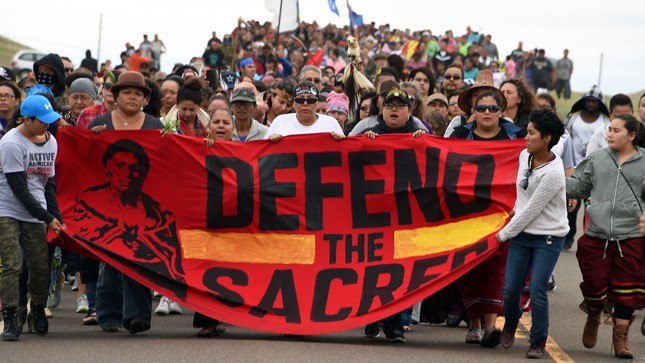Stand with the Standing Rock Sioux
November 14, 2016
In recent months, the nation has turned its attention to a group of people often forgotten: the Standing Rock Sioux Native American Tribe. The Standing Rock Sioux are protesting the construction of the Dakota Access Pipeline because of the potential harms it poses to their safety and culture. Because the pipeline is to be built beneath the Sioux’s primary water source in the Missouri River, many fear that a leak would be catastrophic. Additionally, the pipeline traverses a sacred burial ground which the Sioux believe was not properly bargained for during the permitting process. Protesters have traveled from all over the country to support the tribe’s efforts. In reaction, police have used dogs, pepper spray, and rubber bullets in order to silence the protesters.
In order to gain a thoughtful perspective on this issues, I interviewed Ms. Strausbaugh of the Religion Department. Ms. Strausbaugh is an inspiration to the women of NDP as she has spent much of her life working to protect marginalized communities through protest, service, and education. I asked her the following questions:
1. How are the rights of the Standing Rock Sioux being violated?
I would put what is happening at Standing Rock in the category of Environmental Racism. The pipeline was originally routed to cross the Missouri River north of the city of Bismarck. One of the reasons that plan was rejected is because of the potential threat to Bismarck’s water supply. So the company did what has happened all over this country- moved a toxic problem to a poor or minority area. In addition to the risk of losing their only access to clean water, the pipeline construction has already destroyed burial sites that the tribe holds as sacred. What is happening here is a continuation of the lack of respect that these peoples have experienced since the first settlers came to America.
2. In accordance with CST, what are your thoughts on the environmental risks of the pipeline?
One of the core Catholic Social Teachings is Care for Creation. History has shown us numerous examples of breaks, leaks, and explosions of these pipelines. The environmental risk posed by this pipeline is not only possible local damage to water, but poses the even greater threat of burning fossil fuel as earth’s temperatures continue to rise. Pope Francis has recently challenged us to take this climate emergency seriously. He added an 8th to the Seven Corporal Works of Mercy: “Do something every day to care for the earth.” And he has also proposed six new Beatitudes for the modern era, one of which is “Blessed are those who protect and care for our common home.”
3. What resources can be trusted when researching the Dakota Access Pipeline?
Since network and cable news stations are not covering this story I’ve found that Democracy Now is the most reliable source of information: http://www.democracynow.org/ .
You can also follow Indian Country Media Network: http://indiancountrytodaymedianetwork.com/ and Sacred Stone Camp: http://sacredstonecamp.org/ on both Facebook and Twitter.
4. What can NDP students do to help?
I think that it is realistic to say that if our earth is to be saved, it will be by the indigenous people who are protecting what is left of their land. This is happening all over the world- in North Dakota, Honduras, the Amazon and Indonesia. We can’t go to all of those places, but we can be in solidarity with those, who at the risk of their lives, are protecting the rainforests, mountains and prairies. Here is a list of actions that the Standing Rock Sioux and 200 other tribes gathered there have asked us to do to support them:
• Call for the Army Corps of Engineers’ Permit for the Dakota Access Pipeline to be rescinded via
○ Calls to the White House
○ Emails to your congressional representative
○ Signing a petition.
• Tell the executive of Energy Transfer Partners, L.P. to stop building the pipeline.







